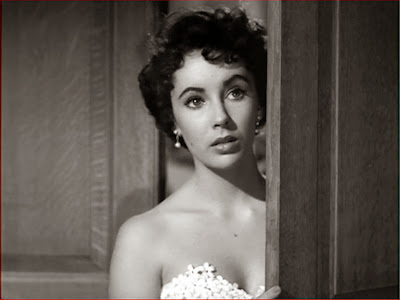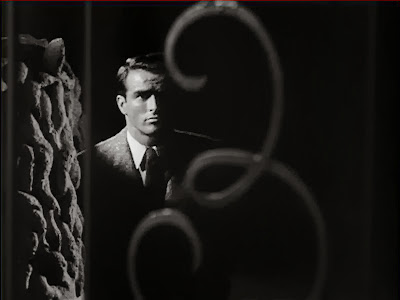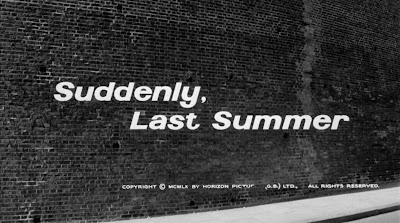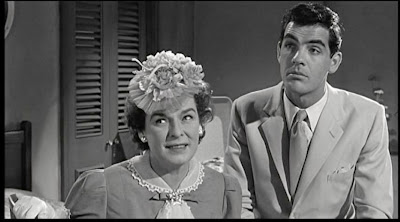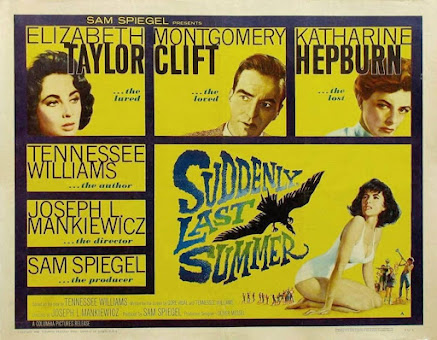"I'm sure you recognize
this lovely melody as 'Stranger in Paradise.' But did you know that the
original theme is from the 'Polovtsian Dance No. 2' by Borodin? So many of the
melodies of well-known popular songs were actually written by the great
masters…."
Thus began the TV
commercial for 120 Music
Masterpieces, a four-LP set of
classical music selections offered by Columbia House and Vista Marketing from
1971 to 1984. This ubiquitous and long-running commercial featured British character
actor John Williams (famous for the Hitchcock films Dial M for Murder and To Catch a Thief, but known in our household as the "fake Mr. French" from the sitcom Family Affair) touting the joys of discovering how many classical melodies were appropriated for contemporary
pop songs.
This commercial and
Williams' cultured English accent unfailingly come to mind whenever I watch The Heiress. The reason being that The Heiress' oft-repeated love theme—the
1784 Jean-Paul-Égide Martini classical composition "Plaisir d'Amour" (The Joys of Love)—had its melody borrowed for the popular ballad "Can't Help Falling in Love" in the 1961 film Blue Hawaii. The unfortunate result of all this is that every time the melody is
played in the movie (and that's quite a lot), it evokes for me not Victorian-era
romance, but Vegas-era Elvis Presley.
 |
| Ever the Method actor, Clift learned to play the piano for this scene in which Morris sings The Joys of Love to Catherine |
This pop-music cross-referencing has always only had the effect of cheapening the original
compositions for me. Coming as it did a full 12 years before Elvis serenaded Joan Blackman in Blue Hawaii, it's not The Heiress's fault Elvis's version (never a favorite) is so hotwired into my brain that I fairly wince every
time Plaisir d'Amour swells on the soundtrack, wrenching me out of The Heiress' scrupulously
rendered 19th century New York, and thrusting me onto some kind of Gilligan's
Island vision of Hawaii. (I react similarly to the now-distracting
use of 1939's Somewhere Over The
Rainbow in the 1941 film noir I Wake Up Screaming.) Happily, my personal aversion to the song "Plaisir d'Amour" and its use in the film's score (something I might share with the film's Oscar-winning/Oscar-disowning composer, Aaron Copland) is the sole complaint I
have with William Wyler's classic romantic melodrama, The Heiress.
 |
| Olivia de Havilland as Catherine Sloper |
 |
| Montgomery Clift as Morris Townsend |
 |
| Ralph Richardson as Dr. Austin Sloper |
 |
| Miriam Hopkins as Lavinia Penniman |
The Heiress is one of my favorite popcorn
movies. And that's "popcorn movie" in the old-fashioned sense: an enjoyably
entertaining film, well-acted, with a good story intelligently told, no heavy
message. Not the current definition of "popcorn movie" signifying critic-proof check-your-brain-at-the-door
exercises in sophomoric cretinism (cue my usual Adam Sandler, Fast & Furious, or movie franchise diatribe).
Based on the 1947 Broadway play by Ruth & Augustus Goetz,
which itself was adapted from Henry James' 1880 novel Washington Square,
The Heiress is a serious drama, to be sure. But anything more profound to be unearthed in its subtext regarding the emotionally stifling social class system or the
lingering imprint of love lost (The Heiress overflows with widows and widowers
who live in the memory of the departed, never entertaining the thought of
finding someone new), remains in service of a not-unfamiliar "Poor Little Rich
Girl" romantic melodrama.
As a motion picture adapted from an esteemed literary work, The Heiress was Paramount's "prestige film" for the year, its pre-release
publicity suggesting a Grand Romance between fated-to-be lovers kept apart by some shadowy adverse obstacle. In truth, the film is really a rather severe and withering
rumination on love (familial love, romantic love, self-love) and the injurious cost
of its absence.
 |
| Three is the Magic Number The Heiress was Montgomery Clift's 3rd film, and his co-star was three years older |
Catherine Sloper (de Havilland) is an unprepossessing, socially
awkward young woman whose very existence is a source of nagging disappointment
to her widowed father, physician Austin Sloper (Richardson). Dr. Sloper's
beloved wife died giving birth to Catherine, yet lives on as an idealized phantom presence in Dr. Sloper's heart, and in the household he shares with his daughter. A
presence to whom Catherine, in her failure to live up to even a modicum of her
mother's beauty or social graces, is ceaselessly compared and judged. Forced to
grow up in the shade of her father's barely contained reproach and resentment,
Catherine's natural virtues (visible to us in private moments where she reveals
herself to have brains and a winning sense of humor) have understandably failed to flower.
Although Dr. Sloper and Lavinia are both of the mind that Catherine's failings in looks and charm are significantly mitigated by her being an heiress with a considerable fortune, Lavinia is too much of a romantic to ever admit to such base pragmatism, while Dr. Sloper regards the assessment as indisputable fact…like a medical diagnosis.
PERFORMANCES
THE STUFF OF DREAMS
Adapted from a Broadway production, The Heiress shows its stage roots in being a somewhat stagy and talky motion picture more reliant on dialogue, performance, and characterization than action. In this instance, I wouldn't have it any other way, for The Heiress has such marvelous, quotable dialogue.
"Headaches! They strike like a thief in the night! Permit me to retire, of course. It's not like me to give in, dear, but sometimes fortitude is folly!"
"How is it possible to protect such a willing victim?"
"Yes, I can be very cruel. I have been taught by masters."
"I can tell you now what you have done. You have cheated me. You thought that any handsome, clever man would be as bored with me as you were. It was not love that made you protect me. It was contempt."
BONUS MATERIAL
Composer Aaron Copland composed the original music theme for The Heiress before it was controversially reworked by Nathan Van Cleve at the direction of William Wyler.
Copyright © Ken Anderson 2009 - 2016
Sharing their home in Washington Square is Dr. Sloper's sister, Lavinia (Hopkins), a somewhat frivolous but prototypical example of the kind of aimless social
butterfly women were expected to be in Victorian times. Given to flights of romantic fantasy and hyperbole, yet well-versed in the dos and don'ts of social protocol, Lavinia is tolerated for her ability to assist Catherine in developing her social graces. Supportive of
her niece and devoted to preventing her from drifting heedlessly into spinsterhood with
only her embroidery to keep her company, Lavinia is yet another pitying voice reminding Catherine of her own lack.
 |
| Miriam Hopkins is the queen of the silly and superficial busybody. No matter how extremely her character is written, she finds both the humor and the humanity |
Although Dr. Sloper and Lavinia are both of the mind that Catherine's failings in looks and charm are significantly mitigated by her being an heiress with a considerable fortune, Lavinia is too much of a romantic to ever admit to such base pragmatism, while Dr. Sloper regards the assessment as indisputable fact…like a medical diagnosis.
Curious, then, that when an outside party is suspected of
appraising Catherine by similarly pragmatic terms—the outside party being the
dashing, obscenely handsome, and penniless young suitor Morris Townsend (Clift)—it is Dr. Sloper who lodges the loudest protest.
 |
| The Heiress opened in Los Angeles on Friday, October 21, 1949 |
What I like about The
Heiress is that it does a remarkable job of placing us at the center of the film's dramatic/romantic conflict without explicitly telling us how we should feel about it. At times, it appears as though Dr. Sloper is unnecessarily brusque in his assessment of his daughter, but he isn't entirely wrong.
At the same time, we also see that there is more to Catherine than her retiring demeanor belies, making us hope that "someone" comes along and sees in her what those around her fail to recognize.
When that someone comes in the form of Montgomery Clift, playing a man in possession of everything that Catherine lacks except money, we can't help but feel (hope) that at least in some ways, this pair is well-suited. Certainly, the superficial attractions of physical beauty are no more a barrier to true love than the superficial allure of wealth.
The Heiress deviates from the play in that it never makes the honorableness of Morris' attentions entirely clear. At least not initially. As the film progresses, we are manipulated back and forth, forced to view Morris' whirlwind courtship of Catherine through the alternating perspective of Dr. Sloper's suspicious eyes or Lavinia's willfully rose-colored gaze.
Provocatively, we're placed in the position of either preferring to be right and hoping that Morris is exposed as a fortune hunter (thereby denying Catherine her happiness), or hoping…perhaps beyond reason…that Townsend is not really what he seems and merely a penniless suitor genuinely seeing in Catherine that which we ourselves have been witness to: that her very real charms have just not been given the opportunity to develop in the loveless home she shares with her father in Washington Square.
When that someone comes in the form of Montgomery Clift, playing a man in possession of everything that Catherine lacks except money, we can't help but feel (hope) that at least in some ways, this pair is well-suited. Certainly, the superficial attractions of physical beauty are no more a barrier to true love than the superficial allure of wealth.
The Heiress deviates from the play in that it never makes the honorableness of Morris' attentions entirely clear. At least not initially. As the film progresses, we are manipulated back and forth, forced to view Morris' whirlwind courtship of Catherine through the alternating perspective of Dr. Sloper's suspicious eyes or Lavinia's willfully rose-colored gaze.
Provocatively, we're placed in the position of either preferring to be right and hoping that Morris is exposed as a fortune hunter (thereby denying Catherine her happiness), or hoping…perhaps beyond reason…that Townsend is not really what he seems and merely a penniless suitor genuinely seeing in Catherine that which we ourselves have been witness to: that her very real charms have just not been given the opportunity to develop in the loveless home she shares with her father in Washington Square.
The film tugs at our beauty biases, our belief in Cinderella fantasies, and our weakness for ugly
duckling myths. It also, by providing an emotionally and dramatically satisfying ending that deviates from the novel, taps into the kind of cathartic revenge scenario beloved by anyone who has ever felt undervalued or underestimated.
WHAT I LOVE ABOUT
THIS FILM
Popular Hollywood movies all tap into common fantasies and myths. Anyone who has ever responded to a film has likely done so because that movie supported or tapped into an already held belief system or confirmation bias that appeals to us. For example, there clearly must be a market out there for romantic comedies about cloddish, schlubby boy-men who win impossibly beautiful women simply because they possess an ounce of common decency. That is to say, I assume there to be a market for it based on the sheer number of Seth Rogen and Woody Allen films out there.
Because of the unique circumstances of my adolescence: shy, a member of one of the few African-American families in a largely white neighborhood, gay in an all-boys Catholic high school—I find myself drawn to stories about outsiders. Those who are habitually overlooked and underestimated because they don't conform to established norms.
I'm afraid my response to my formative years are reflected in the brand of "outsider" films which have become my favorites over the years: Carrie (shy teen kills entire senior class), That Cold Day in the Park (shy spinster kills for and imprisons sex slave); 3 Women (shy enigma engages in personality theft - deaths to follow)...you get the picture. While never seriously interested in purging the patina of my youth in such melodramatic ways, I'm aware that revenge fantasies rank inordinately high amongst the films in my collection. Vicarious projection, I guess.
The Heiress fits easily into this informal sub-genre, it being a kind of tragic pop fairy-tale that tells the story of a woman who, having misguidedly invested her sense of self and happiness in finding someone who deems her worthy of being loved, seeks that tenuous approbation in the eyes of not one, but two woefully inadequate men. Though her path is one both heartbreaking and life-alteringly painful, Catherine nevertheless comes to arrive at a place of self-discovery, self-acceptance, and, ultimately, strength.
 |
| "I'd never contradict him." |
The Heiress fits easily into this informal sub-genre, it being a kind of tragic pop fairy-tale that tells the story of a woman who, having misguidedly invested her sense of self and happiness in finding someone who deems her worthy of being loved, seeks that tenuous approbation in the eyes of not one, but two woefully inadequate men. Though her path is one both heartbreaking and life-alteringly painful, Catherine nevertheless comes to arrive at a place of self-discovery, self-acceptance, and, ultimately, strength.
In keeping with the ambiguous emotional tone already established by the film, one can also interpret the ending as representing a tragedy. Life has taken away all that was open and hopeful in Catherine. By the fade-out, we believe she has become a woman who will never be mistreated by a man again, but we also likely sense that she will never open herself to the possibility of love again.
 |
| "That's right, Father. You never will know, will you?" |
Olivia de Havilland's thorough and complete transformation from doting daughter to embittered adversary is as chilling as it is heartbreaking.
PERFORMANCES
When writing this essay, I was surprised to discover that I had only seen Olivia de Havilland in six films. Only two from her Classic Hollywood years, four from her less-than-stellar post-Lady in a Cage period (The Swarm...yikes!). However, this is more a reflection of the type of movies she appeared in (westerns and period adventure films, neither of which is a particular favorite) than a reaction to the actress herself, who, as of this writing, is still with us at the age of 99.
Within my admittedly narrow sphere of exposure, I have nothing but admiration for de Havilland's work in The Heiress. It cannot be an easy feat to imbue an outwardly plain, reactive character like Catherine with as much depth of feeling as de Havilland achieves. Perhaps a flaw in the play's structure is that it is impossible to adapt it in a way that presents Catherine in a light reflective of how her father sees her. Which is to say, Catherine can never really be as dowdy and lacking in grace as her father perceives her to be...she is the star of the piece.
 |
| The Heiress represents Olivia de Havilland's 5th (and final) Oscar nomination and her 2nd win in the Best Actress category |
For the film version, Wyler encourages us to identify with and like Catherine. Her comic resilience in the face of humiliation after humiliation wins us over, and she radiates far more charm than anyone else in the film.
In our being able to so readily appraise and recognize Catherine's worth, her father comes off as the villain before he even gets a chance to show a sympathetic side of his character.
In our being able to so readily appraise and recognize Catherine's worth, her father comes off as the villain before he even gets a chance to show a sympathetic side of his character.
Granted, he's only marginally sympathetic, anyway. One can understand a man missing his wife, but to withhold affection from a motherless child out of repressed resentment or blame is both cruel and tragic. But, as I've mentioned, the turning point in the story depends on Morris's casting and whether the actor portraying him can convincingly depict both sincerity and deception.
I like Montgomery Clift a great deal, but if reports are true that he was deeply dissatisfied with his performance in The Heiress, I can't say his feelings are entirely unfounded. Simply put, he seems to be outclassed and a tad out of his depth when it comes to the performances of de Havilland, Richardson, and Hopkins. To be sure, this could merely be an instance of clashing acting styles, with his co-stars representing a more formal, old-guard style of acting, contrasting with his more relaxed contemporary technique. The latter results in the actor occasionally coming across as stiff and uncomfortable.
However, in his defense, Clift's very "otherness" in manner and speech (whether intentional or not) works marvelously within the context of the story. His Morris Townsend is a character we are meant to be unsure of; unaware of where the real person ends and the artifice begins. He introduces passion and impulse into the Sloper's world of strict formality. Clift's awkwardness, which wreaks havoc with the viewer's ability to ascertain his character's sincerity, winds up adding a great deal to the ambiguity of Morris' motives.
Montgomery Clift's Method-era naturalness comes from somewhere so genuine that you don't entertain for a minute that he is not as he seems. His beauty is suspicious, but his behavior is not. He seems ill-suited to a certain level of showy artifice, so his scenes with de Havilland have a warmth that has you rooting for their union even as you sense it is ultimately impossible.
I like him a great deal in the film, even while recognizing that his portrayal of Morris Townsend is perhaps not one of his strongest performances.
I like Montgomery Clift a great deal, but if reports are true that he was deeply dissatisfied with his performance in The Heiress, I can't say his feelings are entirely unfounded. Simply put, he seems to be outclassed and a tad out of his depth when it comes to the performances of de Havilland, Richardson, and Hopkins. To be sure, this could merely be an instance of clashing acting styles, with his co-stars representing a more formal, old-guard style of acting, contrasting with his more relaxed contemporary technique. The latter results in the actor occasionally coming across as stiff and uncomfortable.
However, in his defense, Clift's very "otherness" in manner and speech (whether intentional or not) works marvelously within the context of the story. His Morris Townsend is a character we are meant to be unsure of; unaware of where the real person ends and the artifice begins. He introduces passion and impulse into the Sloper's world of strict formality. Clift's awkwardness, which wreaks havoc with the viewer's ability to ascertain his character's sincerity, winds up adding a great deal to the ambiguity of Morris' motives.
 |
| Sizing Up The Interloper |
I like him a great deal in the film, even while recognizing that his portrayal of Morris Townsend is perhaps not one of his strongest performances.
 |
| As Audrey Hepburn did in Two for the Road, Olivia de Havilland is able to convey very distinct stages in the emotional maturation of her character simply through her facial expressions, body language, and voice modulation. Here, Catherine Sloper has grown into a woman at peace with herself |
THE STUFF OF FANTASY
The Heiress garnered a whopping eight Academy Award nominations in 1949: Best Picture, Director, Supporting Actor (Richardson), Cinematography - winning in the categories of Best Actress (de Havilland), Music (Aaron Copland..a matter of contention), Art Direction (J. Meehan, H. Horner, E. Kuri), and Costume Design (Edith Head, Gile Steele).
I'm particularly fond of the costume design and art direction in The Heiress, which is truly gorgeous. Even more so with today's digital restorations and HD TV screens.
The Heiress garnered a whopping eight Academy Award nominations in 1949: Best Picture, Director, Supporting Actor (Richardson), Cinematography - winning in the categories of Best Actress (de Havilland), Music (Aaron Copland..a matter of contention), Art Direction (J. Meehan, H. Horner, E. Kuri), and Costume Design (Edith Head, Gile Steele).
I'm particularly fond of the costume design and art direction in The Heiress, which is truly gorgeous. Even more so with today's digital restorations and HD TV screens.
THE STUFF OF DREAMS
Adapted from a Broadway production, The Heiress shows its stage roots in being a somewhat stagy and talky motion picture more reliant on dialogue, performance, and characterization than action. In this instance, I wouldn't have it any other way, for The Heiress has such marvelous, quotable dialogue.
"No child could compete with
this image you have of her mother. You've idealized that poor dead woman beyond
all human recognition."
"Headaches! They strike like a thief in the night! Permit me to retire, of course. It's not like me to give in, dear, but sometimes fortitude is folly!"
"He must come. He must take me away. He must love me. He must!...Morris will love me, for all those who
didn't."
"How is it possible to protect such a willing victim?"
"Yes, I can be very cruel. I have been taught by masters."
"I can tell you now what you have done. You have cheated me. You thought that any handsome, clever man would be as bored with me as you were. It was not love that made you protect me. It was contempt."
Clip from "The Heiress" (1949)
BONUS MATERIAL
 |
| Maggie Smith, Jennifer Jason Leigh, and Ben Chaplin |
Washington Square (1997): Agnieszka Holland - the director of the startlingly misguided 2014 TV-movie remake of Rosemary's Baby - helmed this impressive-looking adaptation of Henry James' short novel starring Jennifer Jason Leigh, Albert Finney, and Maggie Smith. It's truer to the book than either the play or the 1949 film, so purists should be happy. I enjoyed it, and it's certainly well-acted and dramatically satisfying, but perhaps The Heiress is too deeply rooted in my psyche to make room for this handsome version, which bears the distinction of having been written, directed, and co-produced by women.
It's recommended for its faithfulness to James' text and would make a perfect viewing experience for a high school English class. You can see a clip from Washington Square HERE.
The legendary 120 Music Masterpieces TV commercial










